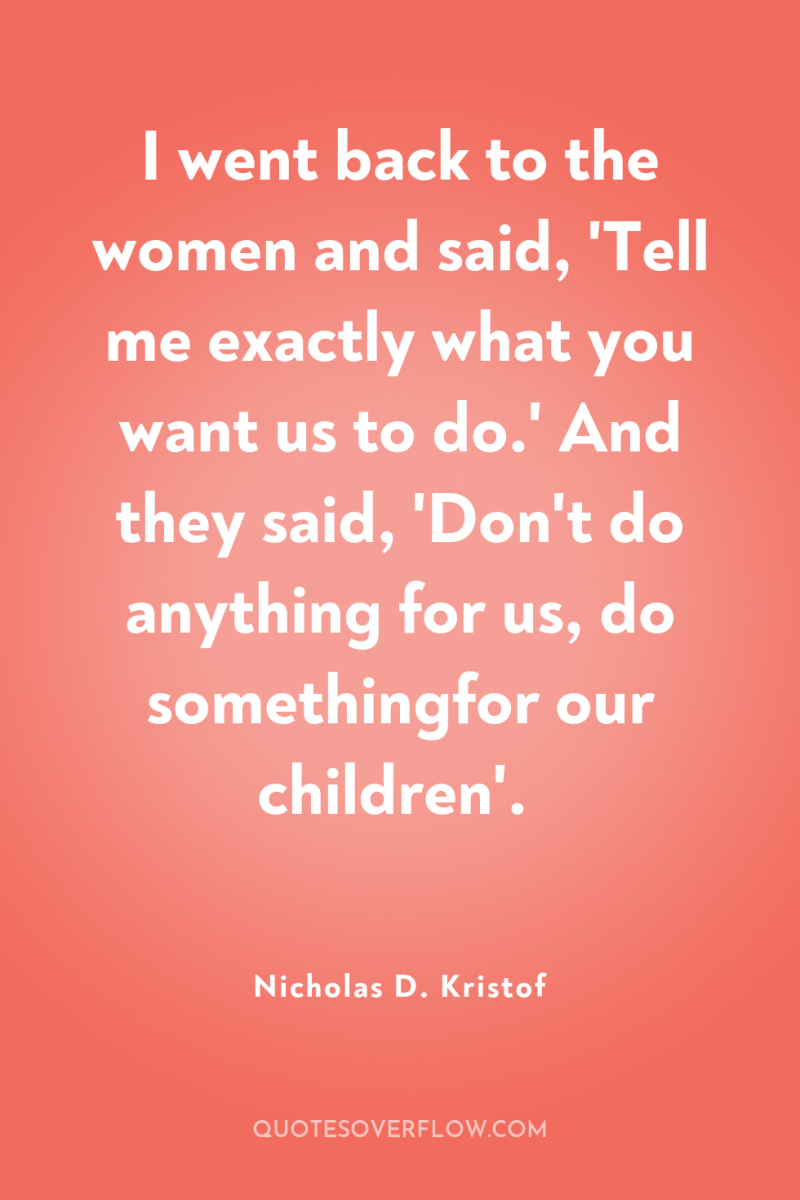1
Conservatives, who have presumed that the key to preventing AIDS is abstinence-only education, and liberals, who have focused on distribution of condoms, should both note that the intervention that has tested most cost-effective in Africa is neither... Secular bleeding hearts and religious bleeding hearts will have to forge a common cause.Nicholas D. Kristof
2
When anesthesia was developed, it was for many decades routinely withheld from women giving birth, since women were "supposed" to suffer. One of the few societies to take a contrary view was the Huichol tribe in Mexico. The Huichol believed that the pain of childbirth should be shared, so the mother would hold on to a string tied to her husband's testicles. With each painful contraction, she would give the string a yank so that the man could share the burden. Surely if such a mechanism were more widespread, injuries in childbirth would garner more attention.Nicholas D. Kristof
3
In the nineteenth century, the central moral challenge was slavery. In the twentieth century, it was the battle against totalitarianism. We believe that in this century the paramount moral challenge will be the struggle for gender equality around the world.Nicholas D. Kristof

4
I went back to the women and said, 'Tell me exactly what you want us to do.' And they said, 'Don't do anything for us, do somethingfor our children'.Nicholas D. Kristof
5
In India, a "bride burning"-- to punish a woman for inadequate dowry or to eliminate her so a man can remarry-- takes place approximately once every two hours, but rarely constitute news.Nicholas D. Kristof
6
Rescuing girls from brothels is the easy part, however. The challenge is keeping them from returning. The stigma that girls feel in their communities after being freed, coupled with drug dependencies or threats from pimps, often lead to return to the re-light district.Nicholas D. Kristof
7
There are 2-3 millions prostitutes in India, and although many of them now sell sex to some degree willingly, and are paid, a significant share of them entered the sex industry unwillingly.Nicholas D. Kristof
8
Anybody who has spent time in Indian brothels and also, say, at Indian brick kilns knows that it is better to be enslaved working a kiln. Kiln workers most likely live together with their families, and their work does not expose them to the risk of AIDS, so there's always hope of escape down the road.Nicholas D. Kristof
9
Here, in impoverished northern India state of Bihar, near the Nepalese border, there's not much else available commercially-- except sex.Nicholas D. Kristof
10
Imagine the outcry if the Pakistani or Indian governments were burning women alive at those rates. Yet when the government is not directly involved people shrug.Nicholas D. Kristof
11
It was in 1931 that the historian James Truslow Adams coined the phrase “the American dream.” The American dream is not just a yearning for affluence, Adams said, but also for the chance to overcome barriers and social class, to become the best that we can be. Adams acknowledged that the United States didn’t fully live up to that ideal, but he argued that America came closer than anywhere else.Nicholas D. Kristof
12
But they had learned an important lesson about how defeating poverty is more difficult than it seems at first.Nicholas D. Kristof
13
One of the great failings of the American education system (in our view) is that young people can graduate from university without any understanding of poverty at home or abroad.Nicholas D. Kristof
14
So let us be clear about this up front: We hope to recruit you to join an incipient movement to emancipate women and fight global poverty by unlocking women's power as economic catalysts. That is the process under way - not a drama of victimization but of empowerment, the kind that transforms bubbly teenage girls from brothel slaves into successful businesswomen. This is a story of transformation. It is change that is already taking place, and change that can accelerate if you'll just open your heart and join in. .Nicholas D. Kristof
15
Often we blame a region's religion when the oppression instead may be rooted in its culture. Yet, that acknowledged, it's also true that .. . it is often cited by the oppressors.Nicholas D. Kristof
16
The tide of history is turning women from beasts of burden and sexual playthings into full-fledged human beings.Nicholas D. Kristof
17
Even though we are peripheral to the slavery, our action is necessary to overcome a horrific evil.Nicholas D. Kristof
18
Americans of faith should try as hard to save the lives of African women as the lives of unborn fetuses.Nicholas D. Kristof
19
In talking about misogyny and gender-based violence, it would be easy to slip into the conceit that men are the villains. But it's not true. Granted, men are often brutal to women. Yet it is women who routinely manage brothels in poor countries, who ensure that their daughter's genitals are cut, who feed sons before daughters, who take their sons but not their daughters to clinics for vaccination. .Nicholas D. Kristof
20
Every year 3.1 million Indian children die before the age of 5, mostly from diseases of poverty like diarrhea.Nicholas D. Kristof
21
The world spends $40 billion a year on pet food.Nicholas D. Kristof
22
You don't need to invade a place or install a new government to help bring about a positive change.Nicholas D. Kristof